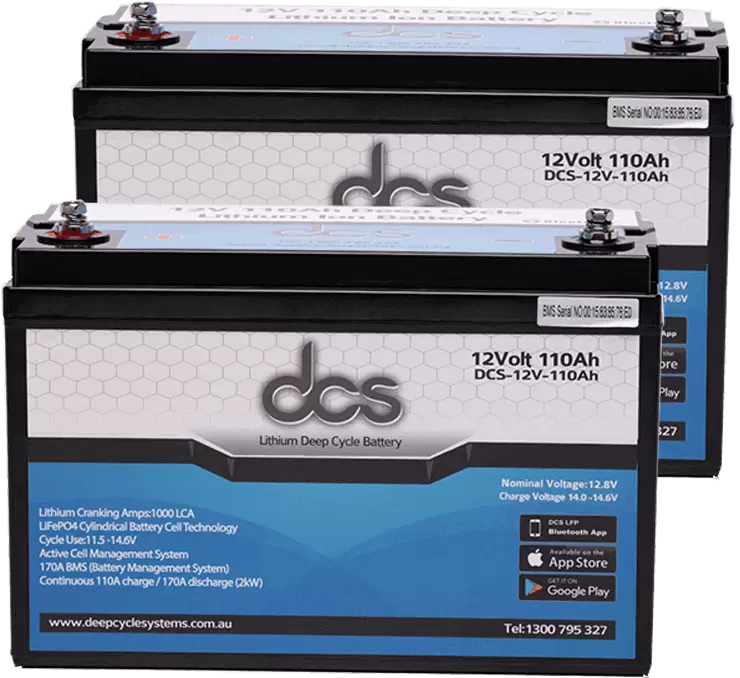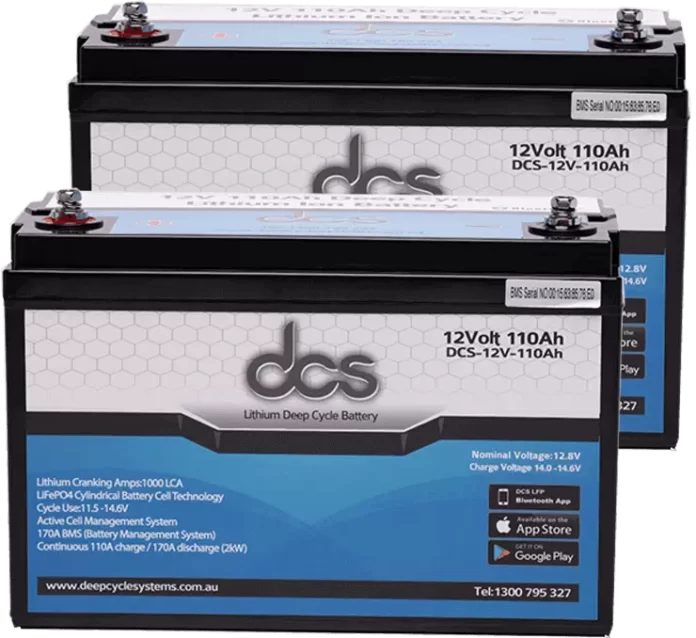Are you tired of constantly relying on the grid for your energy needs? Are you looking for a more sustainable and reliable power solution? Look no further than deep cycle solar battery. These deep-cycle batteries are designed to store solar energy, providing long-lasting and efficient power for off-grid and sustainable applications. With the increasing popularity of solar energy, it’s important to understand your options for solar batteries. In this blog post, we will discuss the different types of solar batteries available and how they can help you take control of your energy needs. Say goodbye to unpredictable energy bills and hello to a more environmentally friendly and self-sufficient way of powering your home or business.
Understanding Deep-Cycle Solar Batteries
Deep-cycle solar batteries are a vital component of any solar energy system. Unlike traditional car batteries, which provide short bursts of high power, deep-cycle batteries are designed to provide a steady, sustained energy output over a longer period. They are specifically engineered to be charged and discharged repeatedly, making them ideal for storing solar energy.
These batteries use a chemical reaction to convert and store energy from the sun. They consist of a series of cells that contain positive and negative plates immersed in an electrolyte solution. As sunlight hits the solar panels, the energy is converted into electrical energy and sent to the battery for storage.
One of the key benefits of deep-cycle solar batteries is their ability to withstand repeated charging and discharging cycles without losing capacity. This makes them highly reliable and durable, ensuring a consistent power supply even in cloudy or low-light conditions.
In addition, deep-cycle batteries have a longer lifespan compared to other types of batteries, making them a cost-effective option in the long run. With proper maintenance and care, these batteries can last 5 to 15 years, depending on the brand and quality.
Overall, deep-cycle solar batteries provide a sustainable and efficient way to store solar energy. They offer a reliable power source, making you less reliant on the grid and reducing your carbon footprint.
 Why Choose Deep-Cycle Solar Batteries?
Why Choose Deep-Cycle Solar Batteries?
If you’re considering a solar energy system for your home or business, deep-cycle solar batteries are an excellent choice for storing that energy and providing a reliable power source. But why should you choose deep-cycle solar batteries over other options?
First and foremost, deep-cycle solar batteries are specifically designed to withstand repeated charging and discharging cycles. This means they can efficiently store and release energy from the sun, providing a consistent power supply even in cloudy or low-light conditions. With their longer lifespan compared to other types of batteries, deep-cycle solar batteries are a cost-effective investment that can last for up to 15 years with proper maintenance.
Deep-cycle solar batteries offer a sustainable and environmentally friendly way to power your home or business. Reducing your reliance on the grid can decrease your carbon footprint and contribute to a greener future. With the increasing popularity of solar energy, choosing deep-cycle solar batteries allows you to stay ahead of the curve and take advantage of its many benefits.
So, if you want to take control of your energy needs and harness the sun’s power, deep-cycle solar batteries are the way to go. Invest in a reliable, sustainable, and efficient power solution that will keep your lights on and your energy bills low for years.
Different Types of Deep-Cycle Solar Batteries
There are several types to consider when it comes to deep-cycle solar batteries. Each type has unique characteristics and advantages, so it’s important to understand your options before deciding.
One popular type of deep-cycle solar battery is the lead-acid battery. These batteries are known for their reliability and affordability. They come in two main types: flooded and sealed lead-acid batteries. Flooded lead-acid batteries require regular maintenance and ventilation but offer a longer lifespan and higher capacity. On the other hand, sealed lead-acid batteries are maintenance-free and can be installed in any position, making them a convenient choice.
Another option is the lithium-ion battery. Lithium-ion batteries are lightweight and compact, making them ideal for portable solar systems. They have a longer lifespan than lead-acid batteries and can be charged and discharged faster. However, they are generally more expensive upfront.
Gel batteries are another type of deep-cycle solar battery often used in off-grid applications. These batteries are known for their resistance to vibration and high temperatures, making them suitable for harsh environments.
Ultimately, the best type of deep-cycle solar battery for you will depend on your specific needs and budget. It’s important to carefully consider each type’s characteristics and advantages before deciding.
Maximizing the Efficiency of Your Solar Battery
To ensure you get the most out of your deep-cycle solar battery, there are several steps you can take to maximize its efficiency. First and foremost, proper maintenance is key. Regularly inspect your battery for any signs of damage or corrosion, and clean the terminals to ensure a good connection. It’s also important to monitor the battery’s charge level and avoid overcharging or discharging it too much, as this can decrease its lifespan.
Another way to boost efficiency is by optimizing your solar energy system. Ensure your solar panels are properly installed and positioned for maximum sunlight throughout the day. Additionally, consider adding a charge controller to regulate the energy flow between the panels and the battery, preventing overcharging and improving overall efficiency.
Sizing Your Deep Cycle Battery Solar System
When it comes to sizing your deep cycle battery solar system, there are a few factors to consider. The size of your solar battery system will depend on your energy needs and how much solar energy you want to store.
First, you need to calculate your daily energy consumption. Look at your electricity bills and determine how much energy you typically use daily. This will give you an idea of how much storage capacity you’ll need from your solar batteries.
Next, consider the solar panels you have installed or plan to install. The size and efficiency of your solar panels will affect how much energy you can generate and store. A larger solar panel array will generate more energy, allowing you to store more in your batteries.
Lastly, think about your location and the amount of sunlight you receive. If you live in a sunny area, you can get away with a smaller battery system. However, living in a location with less sunlight may require a larger battery system to compensate for the lower energy production.
Cost Considerations for Solar Batteries
When considering solar batteries for your energy needs, it’s important to understand the cost considerations involved. While solar energy is a clean and renewable power source, the initial investment in solar batteries can be a significant expense. However, weighing the upfront costs against the long-term benefits and savings solar batteries provide is essential.
One factor to consider is the energy storage cost per kilowatt-hour (kWh). Different types of deep-cycle solar batteries have varying costs, and choosing the one that best suits your budget and energy needs is important. While lithium-ion batteries may have a higher upfront cost than lead-acid batteries, but they typically offer a longer lifespan and higher efficiency, leading to greater cost savings over time.
Installation costs should also be considered. Professional installation may be required depending on the complexity of your solar energy system and the size of the battery bank. It’s important to factor in the cost of labour and any necessary electrical work when budgeting for your solar battery system.
Lastly, it’s crucial to consider the potential return on investment (ROI) that solar batteries can provide. Solar batteries can save you money in the long run by reducing or eliminating your reliance on the grid and decreasing your energy bills. Additionally, many regions offer incentives and rebates for installing solar energy systems, which can help offset the initial costs.
The Future of Lithium Deep Cycle Battery
As technology advances, so does the Future of lithium deep cycle battery. This battery has proven to be a reliable and efficient option for storing solar energy. However, the Future holds even more promise for this battery.
One exciting development is the increasing energy density of lithium deep-cycle batteries. This means they can store more energy in a smaller, lighter package. As a result, they will become even more compact and versatile, allowing for easier installation and transportation.
Another exciting development is the improvement in the lifespan of lithium deep-cycle batteries. Manufacturers are continuously working on extending the lifespan of these batteries, which will result in even greater cost savings and durability for consumers.
Additionally, technological advancements will likely lead to more intelligent lithium deep-cycle batteries. These batteries may have built-in monitoring and management systems that optimize their performance and efficiency. This means that users will have more control over their energy usage and will be able to maximize the benefits of their solar energy system.
FAQs
Here are the answers to some commonly asked questions about solar batteries:
1. How does deep cycle solar battery work?
Solar batteries store the energy your solar panels generate during the day so that you can use them at night or during periods of low sunlight. When your solar panels produce excess energy, they charge the battery. Then, when you need power, the battery releases stored energy for use. This gives you a continuous and reliable power supply even when the sun isn’t shining.
2. How long do solar batteries last?
The lifespan of a solar battery depends on several factors, including the type of battery and how it is used and maintained. On average, solar batteries can last anywhere from 5 to 15 years. Lithium-ion batteries tend to have a longer lifespan compared to lead-acid batteries. Proper maintenance, such as regularly checking the battery’s charge level and avoiding overcharging or discharging, can extend its lifespan.
3. How much do solar batteries cost?
The cost of solar batteries can vary depending on the type and capacity of the battery. On average, solar batteries can range from a few hundred to a few thousand dollars. While the upfront cost may seem high, it’s important to consider solar batteries’ long-term benefits and savings. Solar batteries can pay for themselves over time with reduced energy bills, potential incentives, and rebates.
Remember, consulting with a solar professional can provide more specific answers tailored to your circumstances and energy needs.
Conclusion
In this blog post, we have explored the world of deep-cycle solar batteries and how they can revolutionize how we power our homes and businesses. By understanding the different types of solar batteries available and their unique advantages, you can make an informed decision that aligns with your energy needs and budget. Deep-cycle solar batteries provide a sustainable and reliable power solution that allows you to be less reliant on the grid and reduce your carbon footprint. With their ability to withstand repeated charging and discharging cycles, these batteries offer a long-lasting and efficient energy storage solution. They are designed to provide a steady, sustained energy output over a longer period, making them perfect for storing solar energy.


